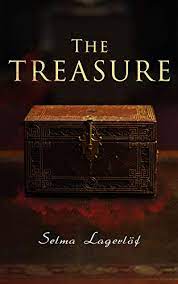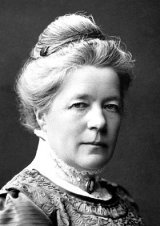The Treasure Page #5
The Treasure is a 1904 novel by the Swedish writer Selma Lagerlof. Its original Swedish title is Herr Arnes penningar, which means "Mr. Arne's money". It has also been published in English as Herr Arne's Hoard. Set in Bohuslän in the 16th century, it tells the story of a group of Scottish mercenaries who escape from prison; they go on to murder a family to steal a treasure chest, after which one of them falls in love with the family's sole survivor.
CHAPTER III THE MESSENGER A week after his death Herr Arne was buried in Solberga church, and on the same day an inquest was held upon the murder in the assize house at Branehog. Now Herr Arne's fame was such throughout Bohuslen, and so many people came together on the day of his funeral, both from the mainland and the islands, that it was as though an army had assembled about its leader. And so great a concourse moved between Solberga church and Branehog that toward evening not an inch of snow could be seen that had not been trampled by men's feet. But late in the evening, when all had gone their ways, came Torarin the fish hawker driving along the road from Branehog to Solberga. Torarin had talked with many men in the course of the day; again and again had he told the story of Herr Arne's death. He had been well entertained too at the assize and had been made to empty many a mug of ale with travellers from afar. Torarin felt dull and heavy and lay down upon his load. It saddened him to think that Herr Arne was gone, and as he approached the parsonage a yet more grievous thought began to torment him. "Grim, my dog," he said, "had I believed that warning of the knives I might have warded off the whole disaster. I often think of that, Grim, my dog. It disquiets my spirit, I feel as though I had had a part in taking Herr Arne's life. Now remember what I say--next time I hear such a thing I will hold it true and be guided by it!" Now while Torarin lay dozing upon his load with eyes half closed, his horse went on as he pleased, and on coming to Solberga parsonage he turned into the yard from old habit and went up to the stable door, Torarin being all unwitting. Only with the stopping of the sledge did he rise up and look about him; and then he fell a-shuddering, when he saw that he was in the yard of a house where so many people had been murdered no more than a week before. He seized the reins at once to turn his horse and drive into the road again, but at that moment he felt a hand upon his shoulder and looked round. Beside him stood old Olof the groom, who had served at the parsonage as long as Torarin could remember. "Have you such haste to leave our house tonight, Torarin?" said the man. "Let be and come indoors! Herr Arne sits there waiting for you." A thousand thoughts came into Torarin's head. He knew not whether he was dreaming or awake. Olof the groom, whom he saw standing alive and well beside him, he had seen a week before lying dead amongst the others with a great wound in his throat. Torarin took a firmer hold of the reins. He thought the best thing for him was to make off as soon as he could. But Olof the groom's hand still lay upon his shoulder, and the old fellow gave him no peace. Torarin racked his brains to find an excuse. "I had no thought of coming to disturb Herr Arne so late in the evening," said he. "My horse turned in here whilst I was unaware. I will go now and find a lodging for the night. If Herr Arne wishes to see me, I can well come again tomorrow." With this Torarin bent forward and struck his horse with the slack of the reins to make him move off. But at the same instant the parson's man was at the horse's head; he caught him by the bridle and forced him to stand still. "Cease your obstinacy, Torarin!" said the man. "Herr Arne is not yet gone to bed, he sits waiting for you. And you should know full well that you can have as good a night's lodging here as anywhere in the parish." Torarin was about to answer that he could not be served with lodging in a roofless house. But before speaking he raised his eyes to the dwelling house, and then he saw that the old timber hall stood unharmed and stately as before the fire. And yet that very morning Torarin had seen the naked rafters thrusting out into the air. He looked and looked and rubbed his eyes, but there was no doubt of it, the parsonage stood there unharmed, with thatch and snow upon its roof. He saw smoke and sparks streaming up through the louver, and rays of light gleaming through the illclosed shutters upon the snow. A man who travels far and wide on the cold highway knows no better sight than the gleam that steals out of a warm room. But the sight made Torarin even more terrified than before. He whipped up his horse till he reared and kicked, but not a step would he go from the stable door. "Come in with me, Torarin!" said the groom. "I thought you had enough remorse already over this business." Then Torarin remembered the promise he had made himself on the road and, though a moment before he had stood up and lashed his horse furiously, he was now meek as a lamb. "Well, Olof groom, here am I!" he said, and sprang down from the sledge. "It is true that I wish to have no more remorse over this business. Take me in to Herr Arne!" But it was with the heaviest steps he had ever known that Torarin went across the yard to the house. When the door was opened Torarin closed his eyes to avoid looking into the room, but he tried to take heart by thinking of Herr Arne. "He has given you many a good meal. He has bought your fish, even when his own larder was full. He has always shown you kindness in his lifetime, and assuredly he will not harm you after death. Mayhap he has a service to ask of you. You must not forget, Torarin, that we are to show gratitude to the dead as to the living." Torarin opened his eyes and looked down the room. He saw the great hall just as he had seen it before. He recognized the high brick stove and the woven tapestries that hung upon the walls. But he glanced many times from wall to wall before daring to raise his eyes to the table and the bench where Herr Arne had been wont to sit. At last he looked there, and then he saw Herr Arne himself sitting in the flesh at the head of the table with his wife on one side and his curate on the other, as he had seen him a week before. He seemed to have just finished his meal, the dish was thrust away, and his spoon lay on the table before him. All the old men and women servants were sitting at the table, but only one of the young maids. Torarin stood still a long time by the door and watched them that sat at table. They all looked anxious and mournful, and even Herr Arne was gloomy as the rest and supported his head in his hand. At last Torarin saw him raise his head. "Have you brought a stranger into the house with you, Olof groom?" "Yes," answered the man, "it is Torarin the fish hawker, who has been this day at the assize at Branehog." Herr Arne's looks seemed to grow more cheerful at this, and Torarin heard him say: "Come forward then, Torarin, and give us news of the assize! I have sat here and waited for half the night."
Translation
Translate and read this book in other languages:
Select another language:
- - Select -
- 简体中文 (Chinese - Simplified)
- 繁體中文 (Chinese - Traditional)
- Español (Spanish)
- Esperanto (Esperanto)
- 日本語 (Japanese)
- Português (Portuguese)
- Deutsch (German)
- العربية (Arabic)
- Français (French)
- Русский (Russian)
- ಕನ್ನಡ (Kannada)
- 한국어 (Korean)
- עברית (Hebrew)
- Gaeilge (Irish)
- Українська (Ukrainian)
- اردو (Urdu)
- Magyar (Hungarian)
- मानक हिन्दी (Hindi)
- Indonesia (Indonesian)
- Italiano (Italian)
- தமிழ் (Tamil)
- Türkçe (Turkish)
- తెలుగు (Telugu)
- ภาษาไทย (Thai)
- Tiếng Việt (Vietnamese)
- Čeština (Czech)
- Polski (Polish)
- Bahasa Indonesia (Indonesian)
- Românește (Romanian)
- Nederlands (Dutch)
- Ελληνικά (Greek)
- Latinum (Latin)
- Svenska (Swedish)
- Dansk (Danish)
- Suomi (Finnish)
- فارسی (Persian)
- ייִדיש (Yiddish)
- հայերեն (Armenian)
- Norsk (Norwegian)
- English (English)
Citation
Use the citation below to add this book to your bibliography:
Style:MLAChicagoAPA
"The Treasure Books." Literature.com. STANDS4 LLC, 2025. Web. 10 Mar. 2025. <https://www.literature.com/book/the_treasure_6>.








Discuss this The Treasure book with the community:
Report Comment
We're doing our best to make sure our content is useful, accurate and safe.
If by any chance you spot an inappropriate comment while navigating through our website please use this form to let us know, and we'll take care of it shortly.
Attachment
You need to be logged in to favorite.
Log In